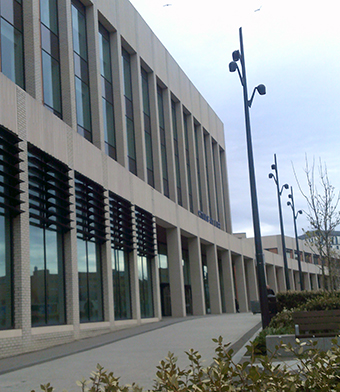On going through my notes from this week’s Aucso campus security managers’ conference at the University of Liverpool, I found particularly fascinating the session by three women on the changes to their universities’ security departments and services.
At such events there’s never enough hours to meet everyone that you would like to and I was only able to speak briefly to one of the three, to compliment her on her talk. So I won’t single any out of Lorna Wallington at York, Tracey McCarthy-Shaw at Brighton, and Tanya Kalsi at Birmingham; introduced by Claire Humble, former cop and head of security at Teesside University who now has her own company, NuParadigm, offering consultancy and training. Besides, while York, Brighton and Birmingham are different campuses (I’m a drop-out from one, I went to another for an open day and chose not to apply to one, and one didn’t exist when I was a student), meaning that you can’t fit a template of securing a campus to a place, it was striking how it sounded like the three had much in common.
An Aucso conference, and I’m well into my third decade of attending, is always an education in itself, if only to see how universities and life in general have moved on since I was young. A Starbucks on a campus (at their prices!)? Women walking around with dyed red hair? Young people sitting outside in April in their shirt sleeves (won’t they catch their death of cold!)? A zebra crossing edged with the colours of the rainbow? If this offends you, or you simply find it baffling, a job on campus is not for you. And as for the cultural argument about diversity and so on, all that needs saying here is that universities have their outwardly bright advertising (and inwardly grim planning) because they are competing for paying students. If students didn’t want coffee and bubble tea shops, rainbow this and that, and being accepted for who they are, you can bet that universities would drop it all in a flash for what students did want.
In terms of securing campus, I found a list that one of the three gave highly significant; of what kind of messages come to the security control room. I was struck by how they’re what you might call safety fears rather than ‘hard’ physical crimes such as bicycle theft (although presumably that still goes on everywhere): ‘someone’s outside my room’; ‘my friend hasn’t come home and I am worried’; ‘I am locked out’. The old-style Security bloke might say (in order): ‘er, can’t you just open your door and ask what they’re doing?’; ‘er, what do you want me to do about it?!’ and as for locking yourself out, doesn’t it serve them right, and if you make it all right won’t they not try so hard to make sure it doesn’t happen again? All these responses (or rather non-responses) might appeal to the older, self-sufficient generation.
Except that students are 1) paying customers who (as one of the three speakers put it) ‘pay a lot of money who feel like they are VIPs’. And if they’re paying £9000 a year in fees, and running up thousands in debts, don’t they deserve a good service? 2) if they don’t get a good service, they’ll be quick to have their say about it with like-minded others, on social media, which can lead to dissatisfied students, word online reaching prospective sixth formers (because how else are they going to get a feel for which places to apply to?), meaning fewer students applying …. And if universities are businesses (and they are), that could soon equal budget cuts all round.
Campus security, or safety, or community safety or safeguarding – all those titles were around at Aucso, a possibly concerning sign of a sector that’s relevant but searching for an identity, and until it agrees on one, how can it be relatable to its clientele? Whatever it’s called, it doesn’t just happen; some manager has to make the change, from the stereotypical blokeish, white shirt and black tie, unapproachable security department. In a word, security has to be a service, serving whoever the paying customers are (which explains association chair Oliver Curran’s title of the 2024 conference, ‘the value add of security services’).
For a dozen or more years, at each uni, managers have been going into the old-style security departments to make changes, more or less inevitably clashing with the old guard with fixed mindsets. Again, to stress, nothing wrong with a fixed mindset; except that it ain’t suiting you for working on campuses any more.
If that sounds appealing, you only have to open your eyes in many towns and cities to see that universities are about the only sector in Britain that’s (outwardly at least) booming, and that has new (pictured, Liverpool John Moores University next door to the University of Liverpool) workplaces and developments in hand. One attender at Liverpool told me that Coventry University has 55pc of the buildings in Coventry city centre; in other words, unis are driving the wider economy (such as pubs and clubs, whether spending in them or working – a source of labour for the security and casual stewarding sector, whether while they study or on graduation?).
Aucso 2025
Aucso’s next Easter conference is due to run at the University of Warwick, outside Coventry, when Ollie Curran of University College London is due to hand over to the vice-chair, Geoff Brown of the University of York. Visit www.Aucso.org.
More in the May and June print editions of Professional Security Magazine.










